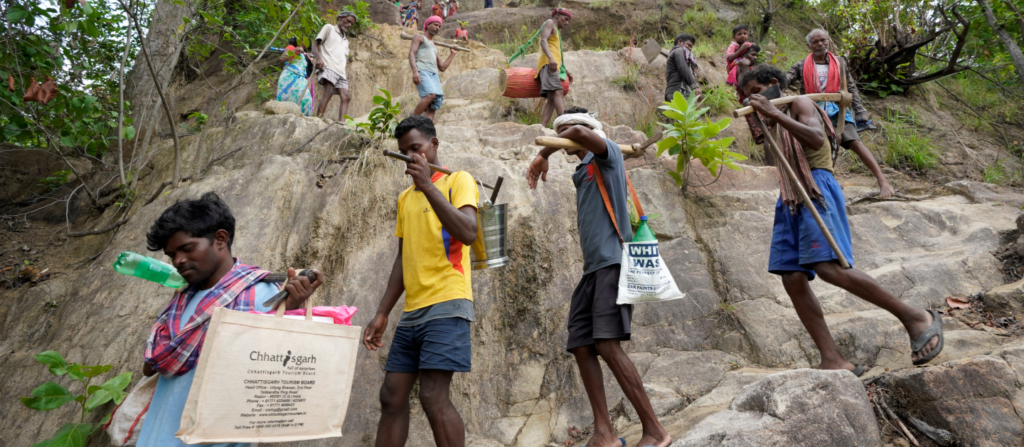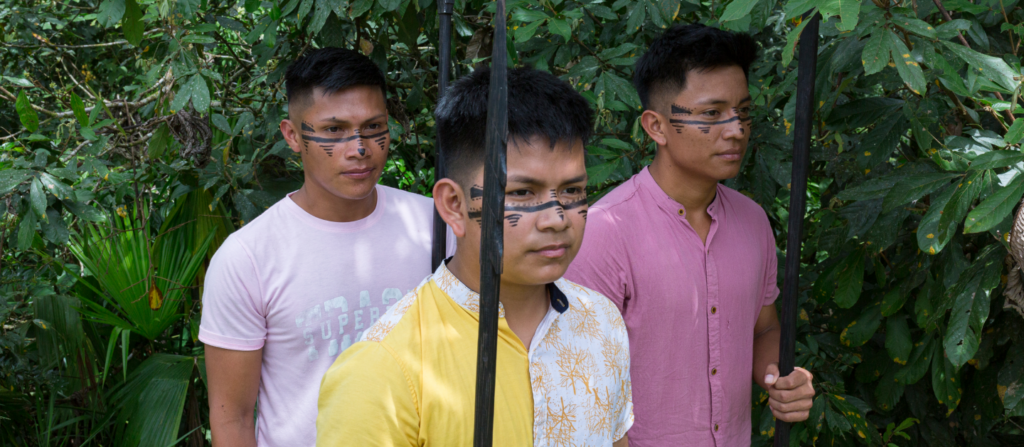Indigenous Peoples and traditional communities are guardians of vast areas of the world’s tropical forests. Their environmentally friendly ways of life, which help protect biodiversity and mitigate climate change, have gained much-needed attention in recent years – including at the UN Climate Conference (COP 26) in Glasgow, Scotland.
Indigenous communities’ ability to continue to protect their ancestral territories and forests is stronger when governments recognise and respect their rights to these resources. Yet governments recognise only around 10% of Indigenous community ownership of these lands. And new threats to traditional land rights are emerging. The rapid expansion of commercial agriculture, logging, mineral extraction and associated infrastructure threatens the tropical forests and other dynamic ecosystems that are vital to our world’s survival.
At the International Land and Forest Tenure Facility, we work alongside Indigenous Peoples and local communities to advance their land rights while sharing the knowledge, innovations and tools that emerge. By building alliances with these select partners, we contribute to their efforts to sustain future generations to the benefit of our entire planet.
Who we are
Since our inception, Tenure Facility has broken new ground by offering flexible, timely and direct support to Indigenous Peoples and local community organisations. Focused primarily on the Amazon, Congo Basin and tropical Asia, we started as the first international financial mechanism exclusively focused on land and forest rights for Indigenous Peoples and local communities.
That mission still guides our work, as do our core values: respect, reliability and trust.
Incubated by the Rights and Resources Initiative (RRI) in 2014, the Tenure Facility was formally established as a foundation in Stockholm in 2017. Our first grants were made two years later.

What we do
Tenure Facility is the leading financial mechanism specialised in supporting Indigenous Peoples and local communities to secure and sustain their land and their forest rights. We work directly with partners to provide targeted funding, along with technical assistance, to help achieve their vision through tailored projects. These efforts benefit our shared planet as well – by reducing deforestation, cutting carbon emissions, restoring ecosystems and promoting human rights.
While primarily a financial mechanism, Tenure Facility also works with its partners to support gender equality, encourage youth involvement, and local governance. Along with mapping, learning events and other areas of engagement, these collaborative initiatives reduce conflict and create a vibrant community of practice.
Indigenous Peoples and local communities are the guardians of the forests and some of our world's greatest natural resources. We work with them to ensure they gain recognition, respect and support.
Our impact
Within our first five years as an independent organisation, we helped Indigenous and local communities to obtain formal government recognition and certification of more than 8.3 million hectares of tropical forest and land. In addition, we helped strengthen Indigenous Peoples’, Afro-descendants’ and communities’ land and forest rights and governance over at least another 10 million hectares, benefiting more than 6,500 communities.
Our projects have also enabled partners to take an essential first step towards building and strengthening their organisational capacity. Additionally, we have expanded our footprint from six to 18 countries and are on course to have more than 30 projects in some of the largest forest regions of the world, including the Amazon, Congo Basin and tropical Asia.
In the coming years, we aim to strengthen Indigenous Peoples' and local community tenure rights over 60 million hectares. This amounts to about 10% of all unrecognised Indigenous Peoples' and local community territories in Latin America, Africa and Asia. We foresee that approximately 15 million peoples' rights to land and forests will be strengthened in the next few years through our partners’ efforts.
18
million hectares, the measurable area where Tenure Facility contributed to strengthening resource rights and territorial governance within a few years.
The Tenure Facility's portfolio currently includes projects with new or existing partners spanning three continents.
Burkina Faso
Democratic Republic of Congo (DRC)
Kenya
Liberia
Mali
India
Indonesia
Nepal
Belize
Bolivia
Brazil
Colombia
Ecuador
Guatemala
Guyana
Panama
Peru
Suriname
Why we are different
Tenure Facility was the first institution of its kind exclusively focused on securing collective rights to land and forests. We recognise that there are no short-term fixes when it comes to achieving tenure rights. Indeed, many communities may struggle for decades to gain recognition and acknowledgement of their management of their ancestral territories, in some cases facing violence and eviction along the way.
Given our relatively large grants, and political challenges in some of the countries where we work, Tenure Facility devotes great attention to financial assurance and risk management, which we seek to adapt to local needs and circumstances.
Tenure Facility was conceived by and for Indigenous Peoples. This also sets us apart from many other organisations working in the field. Moreover, we partner with some of the world's most established Indigenous Peoples' organisations and community-based groups to help them overcome the barriers they face in securing land tenure. Learning exchanges, training events, dialogues and other platforms provide additional opportunities to share the lessons from our partners’ work. They also promote effective ways of funding Indigenous Peoples and community groups.
Our formula of providing large, long-term grants to our partners – typically, US$ 1 to 5 million over five years – distinguishes us from many other funders.

Long-term vision
In a very short time, Tenure Facility has significantly expanded the scale and scope of its support to meet the needs of Indigenous Peoples and local communities. Working with leading bilateral donors and philanthropic foundations, we are scaling up our partnerships in some of the largest forest areas in the world.
We recognise that land tenure rights for the guardians of the forests can create a bridge across continents, strengthen community resilience, and provide a common solution to a sustainable planet. Furthermore, by supporting the rights and involvement of women and young people, we lay the groundwork for more inclusive communities and new generations of leaders who have the knowledge and experience to help tackle our planet’s climate challenges.
Where women have secure collective land and forest rights, they suffer less violence, have better health and livelihoods, and contribute more effectively to protecting the environment.